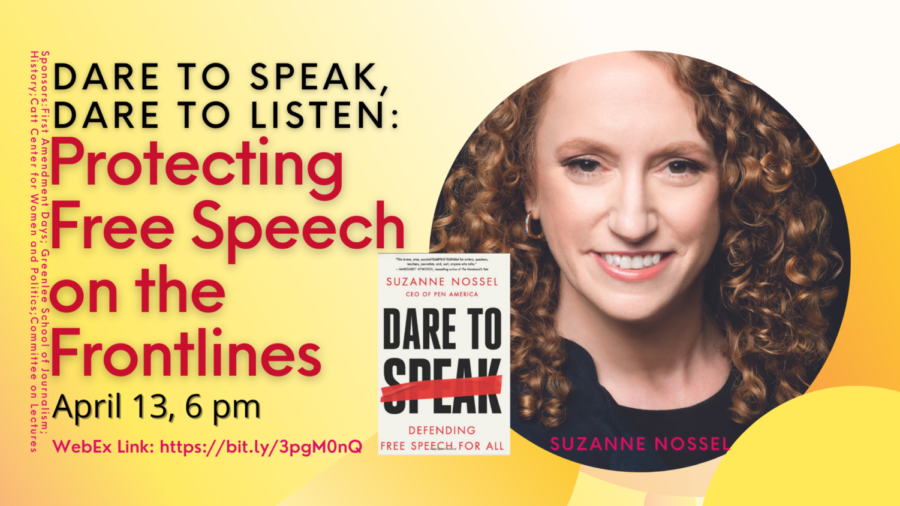Lecture on free speech debates on college campuses
Image courtesy of the First Amendment Committee
Suzanne Nossel lectured on the free speech debate on college campuses Wednesday night.
April 13, 2022
“Dare to Speak, Dare to Listen: Protecting Free Speech on the Frontlines” offered an in-depth look at the debate surrounding free speech on college campuses.
Part of the First Amendment Days celebration, “Dare to Speak, Dare to Listen,” was a lecture by Suzanne Nossel presented Wednesday. The lecture focused on how Americans can live together in the diversity of the United States without resorting to curbing free speech.
Nossel is the chief executive officer of PEN America, the leading human rights and free expression organization. She is also the author of the book “Dare to Speak: Defending Free Speech for All.” She has overseen work on free expression in places such as China, Myanmar, Eurasia and the U.S. Nossel is a leading voice on issues related to free expression both in the U.S. and globally.
“In recent years, [PEN America] has grown alarmed by some of what we see and hear on college campuses,” Nossel said. “We witness two sides talking past each other.”
These two sides, Nossel explains, offer alternative perspectives on free speech on campuses.
According to Nossel, one side advocates for college campuses that are more hospitable to minority experiences and viewpoints. They argue that college norms, traditions, mascots, and history may hold them back from fully experiencing college life because of microaggressions, racism, and discrimination.
The other side worries that political correctness may negatively impact free speech, according to Nossel. They cite speakers being uninvited to college campuses, faculty members being punished for Tweets and comments in class and syllabuses being changed so that material isn’t deemed offensive.
“The presence of different cohorts of students on campuses is a potential boon for free speech,” Nossel said. “We have to acknowledge that this more diverse environment is exposing our old thought-lines in new ways.”
The PEN America organization offers principles that can be applied to help reconcile the desire for campuses to be safe spaces for students while still allowing for all forms of free speech. Their principles can be found at Issues Archive | PEN America and offer specifics for cases regarding academic freedom, campus climate, discrimination and harassment, hateful expression and protests on campus, among others.
“Today’s fight for free speech on campus is part of a broader struggle in society,” Nossel said. “The struggle between those advancing inclusivity … [and] those who worry that this inclusivity may come at the expense of what they think they know and love about America.”

















